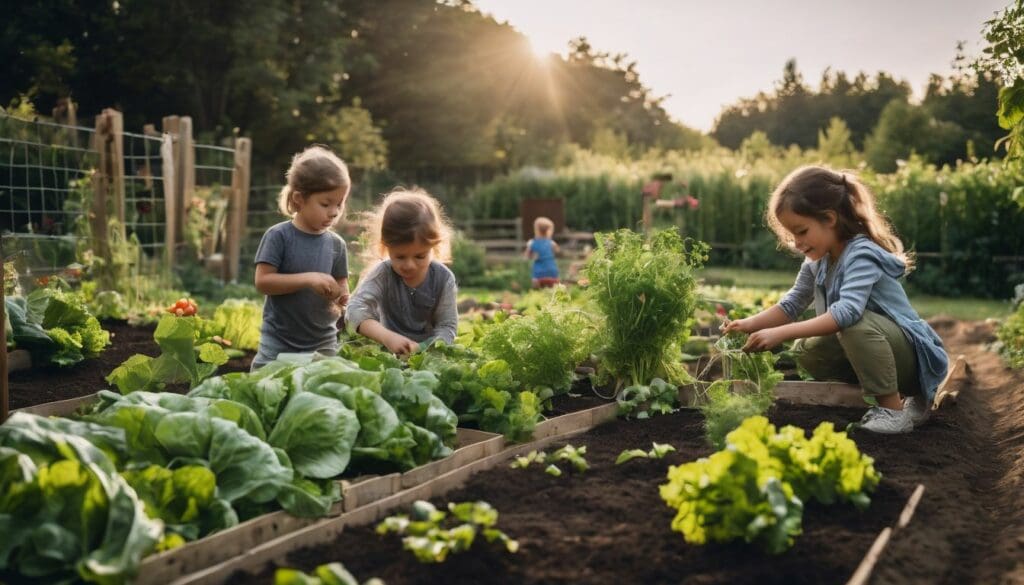As parents, we share a common aspiration: to hand over a planet to our children that’s as green and thriving as possible. It’s a sentiment close to my heart, and I’ve found that embracing green parenting isn’t just talk – it actually has the clout to make a real difference.
Opting for eco-friendly products could slash your household’s carbon emissions by an impressive 20%. Our blog is here to shepherd you through cultivating an environmentally aware haven at home, enhancing not only the wellbeing of your nearest and dearest but also guarding their tomorrows.
Shall we embark on this journey together? Flip the page and let’s start shaping our legacy!
Key Takeaways
- Hosting a Green Parenting Workshop involves teaching families how to make eco – friendly choices and instil sustainable habits in children, which benefits both their health and the environment.
- To ensure the workshop is effective, incorporate activities that parents and children can do together, such as gardening or upcycling projects, to demonstrate practical green living practices.
- Utilise tools like Event Espresso for event organisation to manage registration, communication, scheduling, and feedback effortlessly while reaching a wider audience.
- Encourage participation from the community by connecting with local environmental groups and setting up social media groups where families can share tips and support each other’s journey towards sustainability.
- Teach essential life skills through hands-on experiences tailored to different stages of child development; this helps embed a deeper understanding of environmental responsibility.
What is Green Parenting?
Green parenting is about making environmentally conscious choices for your family, such as using eco-friendly products and teaching sustainable habits to your children. It’s a lifestyle that benefits both the planet and future generations.
Definition of green parenting
Green parenting involves raising our children with a strong awareness and respect for the environment. We make conscious decisions to use eco-friendly products and teach sustainable living practices right from the start.
By choosing reusable diapers, organic baby food, and non-toxic toys, we’re not just protecting our little ones’ health but also minimising our family’s ecological footprint.
Every step we take towards a green household makes a difference. We instil environmentally conscious values in our kids by involving them in recycling projects, gardening, and conserving energy at home.
Our actions model an earth-friendly approach to life that encourages ecoconscious upbringing; this way of life prepares them not only to inherit the planet but also to care for it responsibly.
Benefits for both children and the environment
Encouraging eco-friendly habits in children fosters a deep connection to nature and promotes responsibility towards the environment. By engaging in sustainable practices, children learn about the importance of conservation, waste reduction, and resource preservation from an early age.
They develop a strong understanding of environmental impact and are more likely to adopt green habits throughout their lives.
For families, practicing green parenting leads to healthier living environments with reduced exposure to harmful chemicals found in conventional products. Furthermore, it instils feelings of empowerment and purpose as parents set positive examples for their children by adopting sustainable lifestyle choices.
Starting Your Green Parenting Journey
Connecting with other eco-conscious families in the community and creating a sense of belonging can be a great starting point for your green parenting journey. You can also consider hosting monthly meetups or joining Facebook groups to gain support and exchange ideas with like-minded individuals.
Connecting with other eco-conscious families in the community
To connect with other eco-conscious families in our community, we can consider joining local environmental groups and attending events. We might also reach out to organisations and businesses that promote sustainable living. Besides, we can explore local farmers’ markets and sustainable living fairs to meet like-minded individuals. Engaging in online platforms dedicated to eco-friendly parenting is another effective way to find and connect with other environmentally conscious families. Additionally, participating in workshops and seminars focused on sustainable parenting can provide valuable opportunities for networking within the community.
Creating a Facebook group or hosting monthly meetups
To create a supportive and sustainable community for eco-conscious families, we recommend the following actions:
- Establish a Facebook group dedicated to green parenting. This platform will provide a space for sharing tips, resources, and experiences with like-minded individuals.
- Host monthly meetups at local parks or community centers. These gatherings could include activities such as nature walks, eco-friendly crafts, or group discussions on sustainable parenting practices.
Following influencers and bloggers
To stay updated with the latest eco-friendly parenting tips, we regularly follow influencers and bloggers who share helpful insights and practical advice. These individuals provide valuable information on sustainable parenting workshops and eco-friendly household tips. Here’s a brief look at the key areas that influencers and bloggers can cover:
- Eco-conscious children: Influencers often share strategies for raising green kids, including nature-based parenting ideas and environmentally conscious parenting techniques.
- Sustainable family lifestyle: They offer guidance on incorporating eco-friendly habits into your everyday routine, helping you build a green family lifestyle.
- Green living for families: You can expect to find tips on creating an earth-conscious household and nurturing eco-aware childrearing practices from these experts.
- Environmental parenting strategies: Influencers delve into ways to foster a deep connection with nature in your children and promote sustainable childcare choices.
- Green household tips: They share practical advice for adopting an environmentally friendly approach to household chores, organisation, and maintenance.
Practical Tips for Green Parenting
When it comes to green parenting, there are plenty of practical tips to consider. From choosing eco-friendly baby products to teaching green habits to children, we have you covered with all the essential advice for living a more sustainable family life.
Choosing eco-friendly baby products
When selecting eco-friendly baby products, it’s important to consider their impact on the environment and your child’s health. Here are some thoughtful choices to make:
- Opt for organic cotton or bamboo clothing, which reduces exposure to harmful chemicals and supports sustainable farming practices.
- Choose nappies made from biodegradable materials, such as bamboo or other plant – based fibres, to minimise environmental impact.
- Look for non-toxic and BPA-free feeding utensils and bottles to ensure your child’s safety and reduce plastic waste.
- Consider wooden or sustainably sourced toys to promote a more natural play environment for your child.
Reusing old clothes and toys
Let’s talk about reusing old clothes and toys. It’s an important aspect of green parenting, helping to reduce waste and promote sustainability. When you’re considering reusing old clothes and toys for your children, here are some practical tips to keep in mind:
- Repurpose old clothes by turning them into quilts, blankets or reusable cloth wipes.
- Transform old t – shirts into new outfits or accessories through simple sewing projects.
- Consider hosting a clothing swap with other eco-conscious parents to exchange gently used garments for your kids.
- Reuse old toys by giving them a fresh look with non – toxic paint or embellishments.
- Encourage your children to get involved in upcycling projects, fostering their creativity while promoting sustainable practices.
- Explore DIY toy repair workshops in your community to learn how to fix broken toys instead of discarding them.
Sustainable baby food and nutrition
- Opting for locally sourced and organic fruits and vegetables to reduce carbon footprint from transportation.
- Choosing homemade baby food using organic ingredients to avoid single-use packaging and chemicals.
- Exploring plant-based proteins like lentils, chickpeas, and tofu over meat-based products to reduce environmental impact.
- Prioritising whole grains such as quinoa, brown rice, and oats for their nutritional value and sustainable production methods.
- Considering reusable food pouches or glass containers to store homemade baby meals instead of single-use plastic containers.
- Seeking out sustainably sourced fish options if opting for seafood in your child’s diet.
- Being mindful of portion sizes to prevent food waste and encourage healthy eating habits from an early age.
Building a sustainable nursery
Building a sustainable nursery involves using eco-friendly and non-toxic materials. Consider using organic bedding, such as cotton or wool, and choosing furniture made from sustainable wood or recycled materials. Opt for non-toxic paint and ensure adequate ventilation. Create a calming environment with low-VOC paints and natural lighting. Choose sustainable flooring options like bamboo, cork, or recycled rubber. Incorporate plants into the nursery to improve air quality and create a soothing atmosphere for your child. Remember to consider energy-efficient lighting and appliances to reduce your carbon footprint. These choices can greatly impact your child’s health and the environment.
Teaching green habits to children
After creating a sustainable nursery, the next step is to teach green habits to children. This is crucial in instilling eco-friendly values from a young age. Here are some practical ways to teach green habits to children:
- Engage children in recycling activities, such as sorting and separating waste into recycling bins, teaching them about the importance of reducing waste and conserving resources.
- Involve children in gardening and composting, allowing them to learn about plant life cycles and the benefits of organic waste management.
- Encourage outdoor exploration and nature walks, fostering a love for the environment and wildlife conservation.
- Teach children about energy conservation by turning off lights when leaving a room and using natural light whenever possible.
- Incorporate eco – friendly arts and crafts projects using recycled materials, promoting creativity while emphasising the value of repurposing items.
- Introduce age – appropriate books and educational resources that focus on environmental awareness, helping children understand their impact on the planet.
- Lead by example by adopting sustainable practices at home, demonstrating daily eco-friendly habits for children to emulate.
How to Plan and Organise a Green Parenting Workshop
Understanding child development and psychology is crucial for planning a successful workshop, along with teaching life skills to kids and managing parent burnout. Incorporating parent and child activities will also enhance the overall experience, while using event planning tools like Event Espresso can streamline the organisation process.
Understanding child development and psychology
Children’s development and psychology play a crucial role in green parenting. Recognising the stages of child development helps us tailor eco-friendly practices to their abilities and needs.
By understanding children’s cognitive, emotional, and social growth, we can create age-appropriate activities that foster a deep connection with nature and sustainable living. Incorporating elements of environmental awareness into early childhood education supports the holistic development of eco-conscious habits in young minds.
Understanding the principles of child psychology enables parents to effectively communicate the importance of green living to their children. It allows for creating an encouraging environment for eco-friendly habits while also managing any resistance or challenging behaviours effectively.
Teaching life skills to kids
Understanding child development and psychology is crucial for effectively teaching life skills to kids in a green parenting workshop. By tailoring activities and lessons to align with children’s cognitive, emotional, and physical developmental stages, we can ensure that they are receptive to learning about eco-friendly habits.
Engaging children through hands-on experiences such as gardening, recycling projects, or cooking healthy meals using sustainable ingredients can help them develop a deeper understanding of environmental responsibility.
We encourage parents to involve their children in daily household tasks like sorting recyclables or reducing energy consumption. This not only instills good habits early on but also empowers children to take an active role in caring for the environment.
Managing parent burnout
As parents, we can often feel overwhelmed by the demands of daily life. It’s important to prioritise self-care and seek support from other like-minded individuals in the green parenting community.
Setting clear boundaries, taking time for ourselves, and finding joy in small moments are vital for preventing burnout.
Connecting with other eco-conscious families can provide a sense of camaraderie and validation. Sharing experiences and strategies for sustainable living not only fosters a supportive network but also helps us recharge our energy levels.
Incorporating parent and child activities
We can incorporate parent and child activities that promote eco-consciousness into the workshop, fostering a sense of shared responsibility towards the environment and making sustainable choices a natural part of family life. Here are some engaging activities to include:
- Gardening together to teach children about nurturing and respecting nature.
- DIY upcycling projects that demonstrate creative ways to repurpose items.
- Nature walks or hikes with an emphasis on observing and appreciating the environment.
- Family cooking sessions using organic and locally – sourced ingredients to instil awareness about food sustainability.
- Collaborative art projects using recyclable materials, encouraging creativity while promoting recycling and reducing waste.
- Storytelling or reading sessions with eco – friendly themes to educate and inspire children about environmental stewardship.
- Home energy audit exercises involving children in finding ways to reduce household energy consumption and waste generation.
- Outdoor games that emphasise teamwork, conservation, and appreciation for the natural world, reinforcing green values through play and fun experiences for both parents and children.
Using event planning tools like Event Espresso
To organise a successful green parenting workshop, consider leveraging event planning tools like Event Espresso. This software can help streamline the process and ensure a seamless experience for all participants. Here are some ways to use Event Espresso effectively:
- Customise registration forms to collect essential details about attendees, including their specific interests or challenges related to eco-friendly parenting.
- Utilise the email marketing feature to send out targeted communications about the workshop, sharing relevant resources and tips with registered participants.
- Incorporate a ticketing system to manage attendance and provide flexibility for different workshop activities or sessions.
- Set up automated reminders and notifications to ensure that attendees stay informed about upcoming events, deadlines, or changes in the workshop schedule.
- Use the reporting and analytics tools within Event Espresso to gather insights on attendee engagement and feedback, enabling you to make data-driven decisions for future workshops.
- Leverage the mobile – responsive features of Event Espresso for easy accessibility, allowing participants to register and engage with the workshop content from any device.
- Consider integrating social media promotion directly from Event Espresso to expand your outreach and attract more environmentally conscious individuals interested in green parenting.
Conclusion
To organise a successful Green Parenting Workshop, consider the needs and interests of eco-conscious families. Teaching practical tips for green parenting is essential for both children and the environment.
Engage families in activities that promote sustainable living and create a supportive community for eco-friendly habits. Incorporating interactive sessions will inspire parents to adopt earth-friendly practices at home, ultimately fostering a greener future for generations to come.
FAQs
1. What is a workshop on green parenting all about?
A workshop on green parenting aims to guide families in adopting eco-friendly habits for a sustainable household and nurturing eco-conscious children.
2. Can you give tips on how to host an effective ecofriendly parenting workshop?
To host an effective eco-friendly parenting workshop, focus on practical green living practices for parents and nature-based activities that foster earth-conscious childrearing.
3. How can I make my family’s lifestyle more Earthfriendly through green parenting?
You can create an Earth-friendly home by teaching your kids the importance of protecting nature and practising ecoconscious childrearing together as a family.
4. What kind of activities are included in an ecoconscious parenting workshop?
An Ecoconscious Parenting Workshop includes interactive sessions where families learn about creating an Ecofriendly environment at home and raising awareness among their children.
5. Why should parents consider incorporating Green Parenting into their lives?
Parents should consider Green Parenting because it sets up Ecoaware foundations for kids, ensuring they grow up with respect for the environment and develop lifelong Earthfriendly habits.





